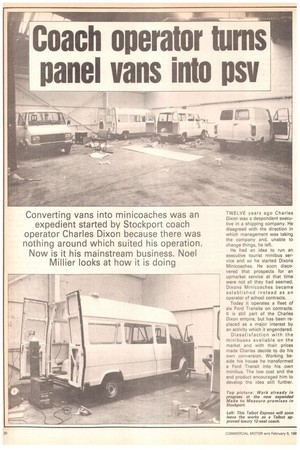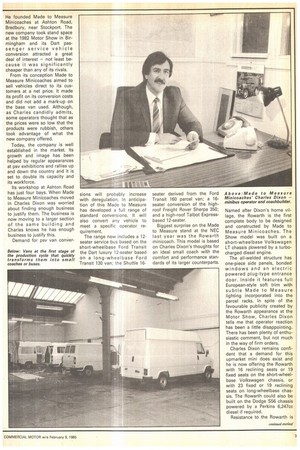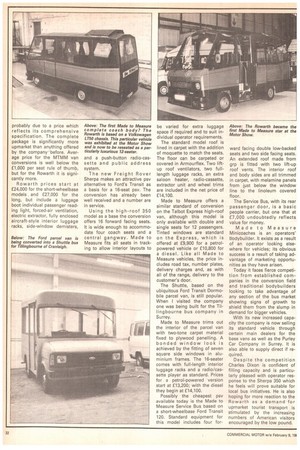Coach operator turns panel vans into psv
Page 32

Page 33

Page 34

If you've noticed an error in this article please click here to report it so we can fix it.
Converting vans into minicoaches was an expedient started by Stockport coach operator Charles Dixon because there was nothing around which suited his operation. Now is it his mainstream business. Noel Millier looks at how it is doing _
TWELVE years ago Charles Dixon was a despondent executive in a shipping company. He disagreed with the direction in which management was taking the company and, unable to change things, he left.
He had an idea to run an executive tourist minibus service and so he started Dixons Minicoaches. He soon discovered that prospects for an upmarket service at that time were not all they had seemed. Dixons Minicoaches became established instead as an operator of school contracts.
Today it operates a fleet of six Ford Transits on contracts. It is still part of the Charles Dixon empire, but has been replaced as a major interest by an activity which it engendered.
Dissatisfaction with the minibuses available on the market and with their prices made Charles decide to do his own conversion. Working beside his house he transformed a Ford Transit into his own minibus. The low cost and the end product encouraged him to develop the idea still further. He founded Made to Measure Minicoaches at Ashton Road, Bredbury, near Stockport. The new company took stand space at the 1982 Motor Show in Birmingham and its Dart passe nger service vehicle conversion attracted a great deal of interest — not least because it was significantly cheaper than any of its rivals.
From its conception Made to Measure Minicoaches aimed to sell vehicles direct to its customers at a net price, It made its profit on its conversion costs and did not add a mark-up on the base van used. Although, as Charles candidly admits, some operators thought that as the prices were so low that the products were rubbish, others took advantage of what the new company offered.
Today, the company is well established in the market. Its growth and image has been helped by regular appearances at psv exhibitions and rallies up and down the country and it is set to double its capacity and its workforce.
Its workshop at Ashton Road has just four bays. When Made to Measure Minicoaches moved in Charles Dixon was worried about finding enough business to justify them. The business is now moving to a larger section of the same building and Charles knows he has enough business to justify this.
Demand for psv van conver sions will probably increase with deregulation. In anticipation of this Made to Measure has developed a full range of standard conversions. It will also convert any vehicle to meet a specific operator requirement.
The range now includes a 12seater service bus based on the short-wheelbase Ford Transit the Dart luxury 12-seater based on a long-wheelbase Ford Transit 130 van; the Shuttle 16 seater derived from the Ford Transit 160 parcel van; a 16seater conversion of the highroof Freight Rover Sherpa 350; and a high-roof Talbot Expressbased 12-seater.
Biggest surprise on the Made to Measure stand at the NEC last year was the Rowarth minicoach. This model is based on Charles Dixon's thoughts for an ideal small coach with the comfort and performance stan dards of its larger counterparts Named after Dixon's home village, the Rowarth is the first complete body to be designed and constructed by Made to Measure Minicoaches. The Show model was built on a short-wheelbase Volkswagen LT chassis p'owered by a turbocharged diesel engine.
The all-welded structure has one-piece side panels, bonded windows and an electric powered plug-type entrance door. Inside it features full European-style soft trim with subtle Made to Measure lighting incorporated into the parcel racks. In spite of the favourable publicity created by the Rowarth appearance at the Motor Show, Charles Dixon tells me that operator reaction has been a little disappointing. There has been plenty of enthusiastic comment, but not much in the way of firm orders,
Charles Dixon remains confident that a demand for this upmarket mini does exist and he is now offering the Rowarth with 16 reclining seats or 19 fixed seats on the short-wheelbase Volkswagen chassis, or with 23 fixed or 19 reclining seats on long-wheelbase chassis. The Rowarth could also be built on the Dodge S56 chassis powered by a Perkins 6,24.7cc diesel if required.
Resistance to the Rowarth is probably due to a price which reflects its comprehensive specification. The complete package is significantly more upmarket than anything offered by the company before. Average price for the MTMM van conversions is well below the £1,000 per seat rule of thumb, but for the Rowarth it is signicantly more.
Howarth prices start at £24,000 for the short-wheelbase models and £27,000 for the long, but include a luggage boot individual passenger reading light, forced-air ventilation, electric extractor, fully enclosed aircraft-style interior luggage racks, side-window demisters, and a push-button radio-cassette and public address system.
'The new Freight Rover Sherpa makes an attractive psv alternative to Ford's Transit as a basis for a 16-seat psv. The conversion has already been well received and a number are in service.
Using the high-roof 350 model as a base the conversion offers 16 forward facing seats. It is wide enough to accommodate four coach seats and a central gangway. Made to Measure fits all seats in trackng to allow interior layouts to be varied for extra luggage space if required and to suit individual operator requirements.
The standard model roof is lined in carpet with the addition of moquette to match the seats. The floor can be carpeted or covered in Armourflex, Two liftup roof ventilators, two fulllength luggage racks, an extra saloon heater, radio-cassette, extractor unit and wheel trims are included in the net price of £14,100.
Made to Measure offers a similar standard of conversion on the Talbot Express high-roof van, although this model is only available with double and single seats for 12 passengers. Tinted windows are standard on the Express, which is offered at £9,900 for a petrolpowered vehicle or E10,800 for a diesel. Like all Made to Measure vehicles, the price includes road tax, number plates, delivery charges and, as with all of the range, delivery to the customer's door.
The Shuttle, based on the ubiquitous Ford Transit Dormobile parcel van, is still popular. When I visited the company one was being built for the Tillingbourne bus company in Surrey.
Made to Measure trims out the interior of the parcel van with two-tone carpet material fixed to plywood panelling. A bonded window look is achieved by the fitting of seven square side windows in aluminium frames. The 16-seater comes with full-length interior luggage racks and a radio/cassette player as standard. Prices for a petrol-powered version start at £13,200; with the diesel they begin at £14,100.
Possibly the cheapest psv available today is the Made to Measure Service Bus based on a short-wheelbase Ford Transit 120. Standard equipment for this model includes four for ward facing double low-backed seats and two side facing seats.
An extended roof made from grp is fitted with two lift-up roof vents. The interior roof and body sides are all trimmed in carpet, with melamine panels from just below the window line to the linoleum covered floor.
The Service Bus, with its rear passenger door, is a basic people carrier, but one that at £7,000 undoubtedly reflects value for money.
Made to Measure Minicoaches is an operators' bodybuilder. It exists as a result of an operator looking elsewhere for vehicles; its obvious success is a result of taking advantage of marketing opportunities as they have arisen.
Today it faces fierce competition from established com panies in the conversion field and traditional bodybuilders looking to take advantage of any section of the bus market showing signs of growth to shield them from the slump in demand for bigger vehicles.
With its new increased capacity the company is now selling its standard vehicle through certain main dealers for the base vans as well as the Purley Car Company in Surrey. It is also able to supply direct if required.
Despite the competition Charles Dixon is confident of filling capacity and is particularly pleased with operator response to the Sherpa 350 which he feels will prove suitable for local bus initiatives. He is also hoping for more reaction to the Rowarth as a demand for upmarket tourist transport is stimulated by the increasing numbers of American visitors encouraged by the low pound.


































































































